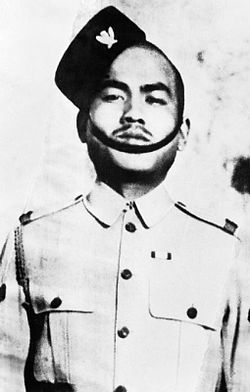Thapa
Thapa (Nepali: थापा; IAST: Thāpā) is a surname used by both, the Magar and the Chhetri communities of Nepal. It is one of the clan among Magars and a prominent Kshatriya lineage among Chhetris. Historically, Thapas served as warriors, rulers, and political leaders, playing important roles in Nepal’s unification, military history, and national governance.
|
Thapa | |
|---|---|
| Meaning | Warrior[1] |
| Language of origin | Nepali Khas language[1] |
| Popularity | Behind the Name |
| Wikipedia articles | All pages beginning with Thapa |

Thapa is a common surname and title in Nepal used by both the Magar and Chhetri communities. Originally, Magar chiefs in the old Magarat kingdoms (such as Gulmi, Palpa, and Pyuthan) bore the Thapa title, serving as regional rulers and warriors long before Nepal’s unification. When the Gorkha kings began uniting the country in the 18th century, many Thapas also joined the Gorkhali army and helped expand the kingdom.
In the early 19th century, Chhetri Thapas rose to high office—most notably Bhimsen Thapa, who became prime minister after 1805 AD, and his ally Amar Singh Thapa, who commanded troops in the Anglo-Nepalese War (1814–1816). At the same time, the elderly Magar hero Bhakti Thapa led soldiers at Deuthal and died in battle at age 71. Although the Thapas lost political power when the Rana dynasty took over in 1846, many Thapas continued to serve with distinction in Nepal’s army and government, and today the name Thapa honors contributions from both Magar and Chhetri lineages.[source?]
Khas Chhetri Thapa
Khas Thapa or Chhetri/Kshatri Thapa are Khas people of Indo-Aryan group. They are categorized into Kshatriya in Hinduism. They follow Hinduism and are divided by Khas clans and Hindu Gotra system. The clan names of Khas Chhetri Thapas are: Bagale Thapa, Punwar Thapa, Godar Thapa, Lamichhane Thapa, Suyal Thapa, Kalikote Thapa, Hrikshen Thapa, Khulal Thapa, Deoja Thapa, Thakuryal Thapa, Gamle Thapa, Sonal Thapa, and many others.
Bagale Thapa

Bagale Thapa is the most prominent clan within Khas Thapa. They fall under Atreya Gotra in Hinduism.
Puwar Thapa
Puwar Thapa is also a clan within Khas Thapa. They fall under Kapil Gotra in Hinduism.
Godar Thapa
Godar Thapa is a clan within Chhetri Thapa Kaji of Khas origin.[2] They claim Kashyap Gotra in the Gotra system of Hinduism.[3][4] They are also the variant of Shivbanshi Godara clan from India.
Magar Thapa
Thapa Magar, or Magar Thapa, are members of the Magar caste, part of the Sino-Tibetan (Tibeto-Burman) ethnic group in Nepal. They speak the Magar language and follow Magar traditions. Thapa Magars were one of the six noble clans (Thar Ghar) who served as warriors and advisers during Nepal’s unification under King Prithvi Narayan Shah. Known for their courage, Thapa Magars played an important role in the Gorkhali army.
In modern times, many Thapa Magars joined the Gurkha regiments of the British and Indian armies, especially during World War I and World War II. Their bravery earned global recognition. Kulbir Thapa Magar was the first Gurkha soldier to receive the Victoria Cross in 1915 during World War I. Other Thapa Magars awarded the VC include Karanbahadur Rana Thapa Magar (1917), Lalbahadur Thapa Magar (1943), Netrabahadur Thapa Magar (1944, posthumously). These soldiers showed exceptional bravery in battle and brought great honor to the Magar community, including the Thapa Magars, who remain celebrated for their loyalty and heroism in Nepalese and world military history.
Thapa Media
References
- ↑ 1.0 1.1 Adhikary, Surya Mani (1997). The Khasa Kingdom: A trans-Himalayan empire of the middle age. Nirala Publications. p. 210. ISBN 8185693501.
- ↑ Pradhan 2012, p. 22.
- ↑ "Nepali surnames, clans and gotra". Retrieved 24 March 2017.
- ↑ Nepal Antiquary, Issue 5. Office of the NepalAntiquary. 1978.
Books
- Pradhan, K.L. (2012), Thapa Politics in Nepal: With Special Reference to Bhimsen Thapa, ISBN 978-81-8069-813-2
- Hamal, Lakshman (1995), Military history of Nepal




